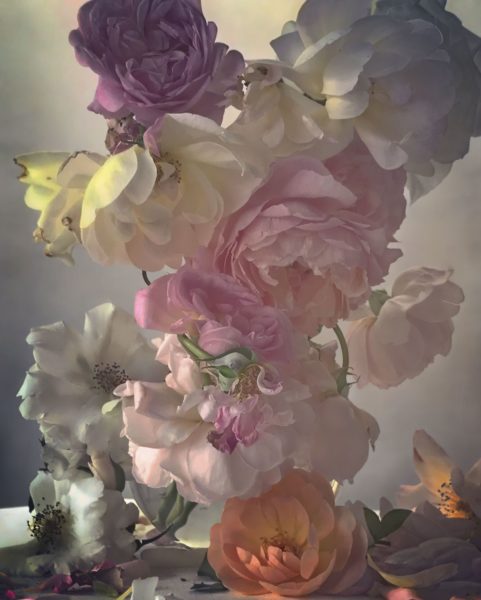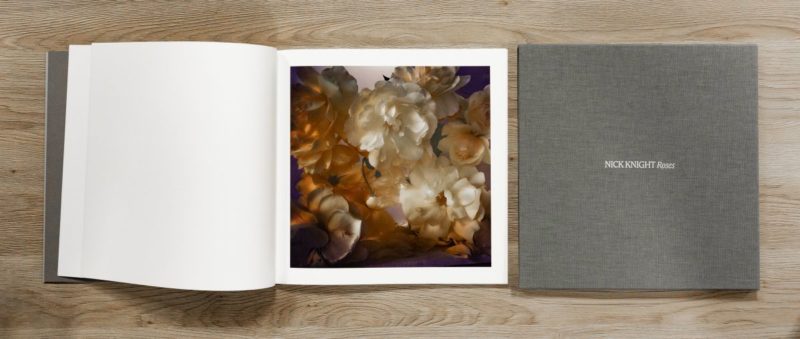Fujifilm Jet Press owner Emmerson Press selected to produce high quality, hardcover book to accompany exclusive photography exhibition
One of Britain’s most celebrated fashion photographers, Nick Knight, has worked with some of the world’s leading fashion designers, including Yohji Yamamoto, John Galliano and Alexander McQueen. He’s photographed advertising campaigns for iconic brands like Christian Dior, Calvin Klein and Yves Saint Laurent. He’s directed music videos for Lady Gaga and Kanye West. And all the while, British photographer Nick Knight has been working on a personal project: taking photos of roses from his garden – on an iPhone.
For years Nick Knight has also been devoting several hours of his own time, on a Saturday or Sunday morning picking roses from his London garden, arranging them on his kitchen table and snapping pictures of them on his phone – exploring colour harmonies and notions of age and decay. He has then been spending a similar amount of time, on a Saturday or Sunday afternoon, experimenting with Instagram filters (he makes no other edits to the photographs) and posting them for his followers to enjoy and engage with.
This year, Knight was offered the opportunity to take this very personal project beyond social media and turn it into a photographic exhibition at the exclusive Albion Barn Gallery in Oxford. The exhibition ran from late June to early November – by appointment only – and to accompany it, the gallery wanted an exclusive, case bound book of the rose photographs. The book had to be exceptionally high quality and, as an exclusive collectable for an appointment only exhibition, it also had to be very short run.
To produce such a book, Knight’s long-time collaborator, art director Paul Hetherington knew exactly where to go. Among many other projects, Hetherington and Knight had previously worked together on a promotional catalogue for up-and-coming fashion label Alyx, and for this project, Hetherington had done extensive research into the latest print technologies on the market to try to find a cost-effective, ultra-high quality option for producing a short run of large format catalogues. His research had led him eventually to the Jet Press, which he described as “the single most impressive piece of print technology” he’d seen in several years of researching the industry.
“I’ve loved the opportunity recently, to rediscover print,” Hetherington says. “For some years I was working on projects that were all online and when exploring the possibilities for the Alyx catalogue, it was exciting to see how far the possibilities in print have moved on. I enjoy thinking not just about how I want a piece of printed material to look – but how I want it to feel too. People want to be physical and tactile with print now – otherwise, why bother printing it? So I find that I start with what I want the look and feel of a printed piece to be, what materials I want it to use, what I want the texture and feel of it to be – and then work backwards from there.”
When tasked with project managing the creation of a book of Knight’s rose photographs, Hetherington turned to the Jet Press owners he’d worked with before: Emmerson Press in Kenilworth.
“I knew what the Jet Press was capable of and I’d worked with Emmerson’s before, so I knew they’d do whatever it took to make it happen and get it right,” says Hetherington.
Jamie Emmerson, Director at Emmerson Press, reflects on the project: “I’d probably say it’s one of the most challenging projects I’ve ever worked on,” he says. “Simply because of the number of different techniques we had to employ. The bulk of the book was printed on our Jet Press 720S (since upgraded to a Jet Press 750S model), including all the roses pictures which were printed using the Jet Press’s Max Gamut colour functionality. There were other elements that we litho or screen printed. The attention to detail in the book is extraordinary, the textured grey slipcase for example is a visual and tactile nod to Nick Knight’s urban, concrete garden in which his roses grow. Paul Hetherington had an extremely clear vision of how he wanted the book to look and feel – right down to the detail of the multiple paper types he wanted to use. He spent some time with us on the factory floor looking at proofs and experimenting with different ways to get the result he wanted. Ultimately, we were delighted to be able to bring a complex project together and produce a beautiful book.”



